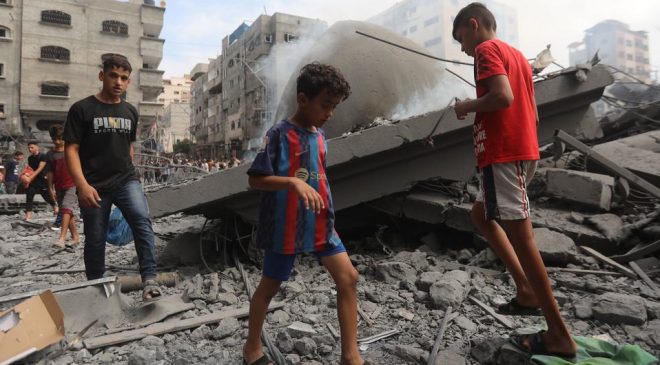
This morning, the Israeli military has issued an evacuation order to over a million people in northern Gaza, which makes up half of the Gaza Strip’s population. The area is surrounded by fences and walls, with naval patrols along the coast and sealed crossings with Israel and Egypt. This leaves few options for the residents, with some seeking refuge in overcrowded homes in the southern part of the strip.
The evacuation order comes amid a series of air strikes that have resulted in the deaths of 1,900 individuals in Gaza, including 583 children. These strikes were launched in response to an unprecedented attack by Hamas-led fighters, who crossed the border into Israel on October 7 and killed hundreds of Israeli civilians, including children, individuals with disabilities, and older people. They ambushed partygoers, shot families inside their homes, and set fire to houses. In retaliation, armed groups in Gaza have fired thousands of rockets indiscriminately at Israeli cities and towns. These acts are considered war crimes, as is Hamas’s threat to execute Israeli hostages.
However, it is crucial to recognize that the war crimes committed by Hamas-led fighters do not justify the Israeli military flouting its obligations towards civilians in Gaza. The evacuation order poses a significant risk of mass forced displacement, particularly for vulnerable populations such as children, individuals with disabilities, older people, and hospital patients. The roads are filled with rubble from destroyed buildings, and essential supplies like fuel, water, food, and electricity have been severely limited by Israeli authorities. This amounts to a form of collective punishment, which is also considered a war crime.
Civilians in Gaza have not had a safe opportunity to flee due to the dangers posed by Israeli air strikes. Seventy people were killed on Friday alone as they attempted to escape south via the designated route. Additionally, Gaza’s main hospital, Shifa, is located within the evacuation zone, making it challenging for people to access necessary medical care. The hospital itself cannot be evacuated and is facing shortages of fuel, medicine, and other supplies, despite the increasing number of injuries from the air strikes.
In armed conflicts, all parties have an obligation to protect civilians, regardless of the actions of their opponents. International humanitarian law upholds fundamental principles of humanity that are non-negotiable. While the Israeli military should issue warnings to civilians in Gaza before an attack if it allows them to leave safely, a warning to evacuate when there is no safe place to go and no safe means of transportation is ineffective.
The evacuation order has been deemed incompatible with international humanitarian law by the International Committee of the Red Cross. The United Nations has warned that this order will have devastating consequences and has called on the Israeli government to establish a humanitarian corridor to provide essential supplies, including water, to civilians. UN Secretary-General António Guterres has urged Israel to rescind the order, highlighting the impossibility for many vulnerable and undersupplied residents of Gaza to evacuate safely. This order undermines US Secretary of State Antony Blinken’s request for Israel to avoid harming civilians in Gaza.
